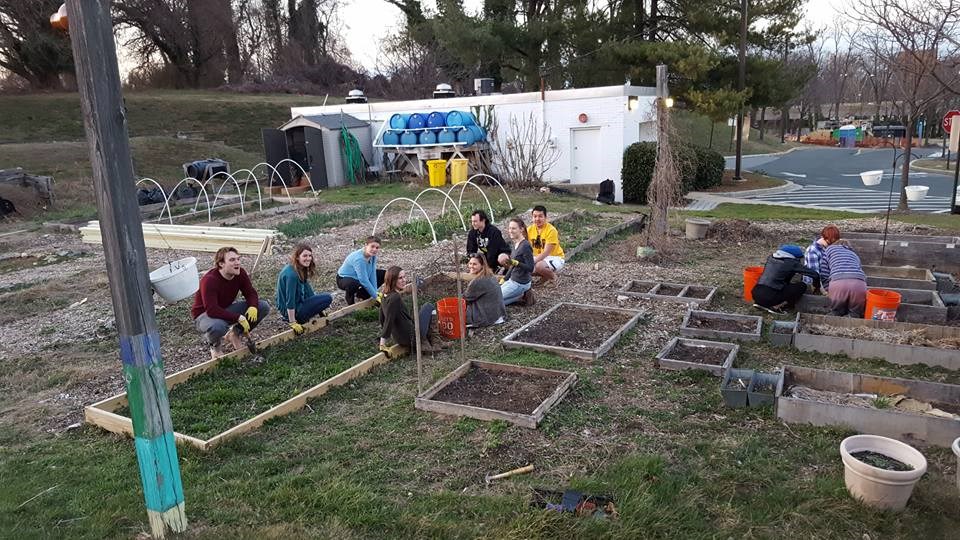
Urban farm looks to put in orchard
By: Keri Luise, Staff Writer
Photo courtesy of Daniel Andrews
Students and faculty are hoping to plant an orchard at the on-campus urban farm this spring, with the goal of increasing campus sustainability and carbon neutrality.
The orchard, which is pending approval from the President’s Council this semester, would be established next to the TU Urban Farm outside of the Administration building.
The farm’s 1,000 square foot vegetable garden is run by student-volunteers and faculty members, and it is home to multiple crop beds and fruit trees that help provide food to the Towson community.
English professor and TU Urban Farm faculty advisor Ben Warner helped start the farm for student involvement purposes in 2009, and the farm had its first growing season in 2010.
“I think that the farm offers a great learning opportunity,” said Megan Arnold, TU Urban Farm student vice president. “I didn’t have much gardening experience before I joined the group and now I know a little more about what a weed looks like and about the work that goes into growing my own food.”
The farm redistributes the produce through Dining Services and directly to students, staff and faculty. Its goal is to work toward community involvement and providing a more local and sustainable food source to TU’s campus.
“It is a great opportunity for students to get hands-on experience growing their own food and become more connected to their food and where it comes from,” said Elena Sachs, co-president of the Student Environmental Organization. “It also provides a great community space for people to come together and work toward a common goal and share in the benefits by enjoying the food that is harvested together.”
Warner hopes that those involved will also form a connection with the sustainability ethic of the TU Urban Farm. Implementing the new orchard is aimed to help improve the campus’ focus on sustainability in the food system.
“I think that by teaching others about our sustainability efforts, they start to think more about how their own actions affect the environment,” Arnold said. “The part of the TU Urban Farm that I really love is the sense of community that it offers. We really try to make the farm an area where everyone can pitch their own ideas. Plus, getting your hands in the dirt while chatting with a friend is a great way to unwind after a long week of classes. And a great way to get to know other people.”
The TU Urban Farm and the possible addition of an orchard will help further the goal of creating a more sustainable campus.
“The orchard will increase the food access, thereby reducing indirect emissions accrued during the food distribution food supply chain,” said Campus Planning and Sustainability Manager Patricia Watson.
The orchard also is aimed to benefit the students involved in the farm by expanding their knowledge and experiences with farming and sustainability.
“I think that [the orchard] will give all the farm members and visitors new opportunities to learn about maintaining the trees,” Arnold said. “It’s very different in that these trees are perennial, so we need to learn how to take care of them and prune them for long-term growth. That’s a little bit of unchartered territory for us, which is exciting.”
According to Sachs, the orchard will also become another important local source of nutrition that will “reduce the distance and amount of fossil fuels that our foods typically require to make it to our plate.”
“The idea is that by implementing native trees and pairing them with partner plants that naturally aid their growth, we will be creating a self-sustaining system that is lower maintenance than typical gardens,” Sachs said.
The SEO is waiting for the space, designed by a Baltimore Orchard Project representative, to be approved by the President’s Council this semester and hopefully planted in the spring.
The American College and University Presidents’ Climate Committee also assists in providing guidance on issues related to TU’s carbon neutrality goal.
“[The ACUPCC] has been predominately focused on energy, transportation, waste, outreach and education, and the curriculum as it relates to sustainability,” Watson said. “Food topics have recently emerged as an issue for this group.”
The orchard and expansion of the TU Urban Farm will be a contribution to improving TU’s carbon neutrality and community involvement.
“The hope is that this will become a community space where students and faculty can come together and participate in creating a healthier and more environmentally friendly campus,” Sachs said.

